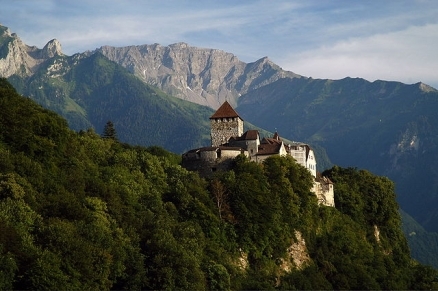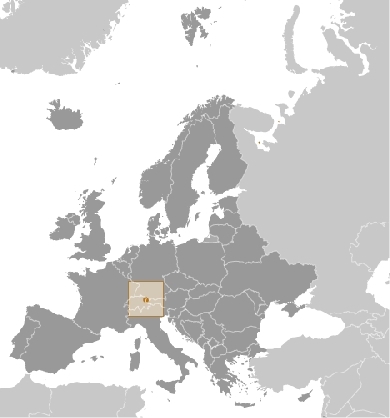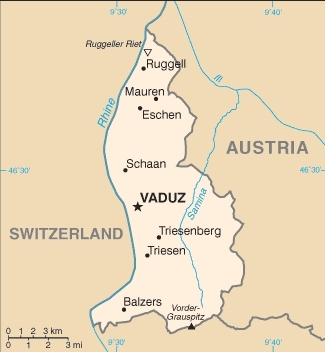Liechtenstein
Liechtenstein (formally the Principality of Liechtenstein) is a small landlocked nation of 37,000 people in central Europe, between Austria and Switzerland.
It is ruled by a parliamentary democracy under a constitutional monarchy, headed by the Prince of Liechtenstein.
Along with Uzbekistan, Liechtenstein is one of only two doubly landlocked countries in the world.
It has a variety of microclimatic variations based on elevation.
The Principality of Liechtenstein was established within the Holy Roman Empire in 1719.
Occupied by both French and Russian troops during the Napoleonic wars, it became a sovereign state in 1806 and joined the Germanic Confederation in 1815.
Liechtenstein became fully independent in 1866 when the Confederation dissolved.
Until the end of World War I, it was closely tied to Austria, but the economic devastation caused by that conflict forced Liechtenstein to enter into a customs and monetary union with Switzerland.
Since World War II (in which Liechtenstein remained neutral), the country's low taxes have spurred outstanding economic growth.
In 2000, shortcomings in banking regulatory oversight resulted in concerns about the use of financial institutions for money laundering. However, Liechtenstein implemented anti-money-laundering legislation and a Mutual Legal Assistance Treaty with the US that went into effect in 2003.
Contents
Geography
Location: Central Europe, between Austria and Switzerland
Geographic Coordinates: 47 16 N, 9 32 E
Area: 160 sq km
Land Boundaries: 76 km (Austria 34.9 km, Switzerland 41.1 km)
Natural Hazards:
Terrain: mostly mountainous (Alps) with Rhine Valley in western third. The highest point is Vorder-Grauspitz (2,599 m) and the lowest point Ruggeller Riet (430 m).
Climate: continental; cold, cloudy winters with frequent snow or rain; cool to moderately warm, cloudy, humid summers
Ecology and Biodiversity
See: Alps conifer and mixed forests
People and Society
Population: 36,713 (July 2012 est.)
Ethnic Groups: Liechtensteiner 65.6%, other 34.4% (2000 census)
Age Structure:
0-14 years: 16.1% (male 2,809/female 2,856)
15-64 years: 69% (male 11,970/female 12,326)
65 years and over: 15% (male 2,304/female 2,971) (2011 est.)
Population Growth Rate: 0.795% (2012 est.)
Birthrate: 10.76 births/1,000 population (2012 est.)
Death Rate: 6.78 deaths/1,000 population (July 2012 est.)
Net Migration Rate: 3.98 migrant(s)/1,000 population (2012 est.)
Life Expectancy at Birth: 81.5 years
male: 79.37 years
female: 84.19 years (2012 est.)
Total Fertility Rate: 1.69 children born/woman (2012 est.)
Languages: German (official), Alemannic dialect
Literacy (age 10 and over can read and write): 100%
Urbanization: 14% of total population (2010) growing at an annual rate of change of 0.9% (2010-15 est.)
History
The Liechtenstein family, of Austrian origin, acquired the fiefs of Vaduz and Schellenberg in 1699 and 1713 respectively, and gained the status of an independent principality of the Holy Roman Empire in 1719 under the name Liechtenstein. The French, under Napoleon, occupied the country for a few years. Napoleon was the founder of the Rhine Confederation in 1806 and accepted Liechtenstein as a member. Liechtenstein considers itself therefore to be a sovereign state since 1806. In 1815 within the new German Confederation, Liechtenstein could prove its independence once more. In 1868, after the German Confederation dissolved, Liechtenstein disbanded its army of 80 men and declared its permanent neutrality, which was declared during both world wars.
In 1919, Liechtenstein and Switzerland concluded an agreement whereby Switzerland assumed representation of Liechtenstein's diplomatic and consular interests in countries where Switzerland maintains representation and Liechtenstein does not. According to an agreement concluded with Austria in 1979, Liechtenstein citizens may seek consular assistance from Austrian representatives abroad in countries in which neither Liechtenstein nor Switzerland maintain representation. After World War II, Liechtenstein became increasingly important as a financial center, resulting in more prosperity. In 1989, Prince Hans Adam II succeeded his father to the throne and in 1996 settled a long-running dispute with Russia over the Liechtenstein family's archives, which had been confiscated during the Soviet occupation of Vienna in 1945 and later moved to Moscow. Liechtenstein has been a participating state of the Organization for Security and Cooperation in Europe (OSCE) since the 1975 start of its predecessor, the Conference on Security and Cooperation in Europe (CSCE). Liechtenstein became a member of the Council of Europe in 1978 and joined the UN in 1990, the European Free Trade Association (EFTA) in 1991, and both the European Economic Area (EEA) and World Trade Organization (WTO) in 1995.
Government
Government Type: constitutional monarchy
According to the constitution, the government is a collegial body consisting of five ministers, including the prime minister. The prime minister and ministers are appointed by the Prince, following the proposals of the parliament.
Amendments to the constitution and new laws have to be adopted by parliament, signed by both the Prince and the prime minister, and published in the Principality's Law Gazette.
Prince Hans Adam II is the head of state. He is entitled to exercise his right to state leadership in accordance with the provisions of the constitution and of other laws. On August 15, 2004 Prince Hans Adam II entrusted Hereditary Prince Alois as his representative with the exercise of all sovereign rights pertaining to him, in accordance with the Liechtenstein constitution.
He represents the state vis-a-vis foreign states. He signs international treaties either in person or delegates this function to a plenipotentiary. In accordance with international law, some treaties only become valid when they have been ratified by the parliament.
The Prince's involvement in legislation includes the right to take initiatives in the form of government bills and the right to veto parliamentary proposals.
The Prince has the power to enact princely decrees. Emergency princely decrees are possible when the security and welfare of the country is at stake. A countersignature by the prime minister is required.
The Prince has the right to convene and adjourn parliament and, for serious reasons, to adjourn it for 3 months or to dissolve it.
The Prince nominates the government, district and high court judges, the judges of the Supreme Court, and the presidents and their deputies of the Constitutional Court and of the Administrative Court of Appeal on the basis of the names put forward by the parliament.
The Prince's other authorities include mitigating and commuting punishments that have been imposed with legal force and the abolition--i.e. the dismissal--of investigations that have been initiated. All judgments are issued in the name of the Prince.
Citizens elect the parliament directly under a system of proportional representation. Until 1989, 15 members represented the population of the two constituencies (6 for the lowland area and 9 for the highland area). Since 1989 the lowland constituency has been entitled to have 10 members and the highland area 15 members.
The duties and working procedures of the parliament are laid down in the constitution and in the parliament's standing orders. The parliament's main task is to discuss and adopt resolutions on constitutional proposals and draft government bills. It has the additional duties of giving its assent to important international treaties, of electing members of the government, judges and board members of the Principality's institutions, setting the annual budget and approving taxes and other public charges, and supervising the administration of the state.
The parliament observes its rights and duties in the course of sessions of the whole parliament and through the parliamentary commissions that it elects. All members of parliament exercise their mandates in addition to their normal professions or occupations. The president of parliament and his deputy are both elected at the opening meeting for the current year. The president convenes the individual meetings during the session, leads them, and represents the parliament externally. Parliament meets eight to ten times each year for a duration of 1 to 3 days depending on the agenda.
During the parliamentary recess--normally from January to February/March--a "state committee" assumes the parliament's duties, and such a committee must also be elected in the case of any adjournment or dissolution of parliament. A "state committee" consists of the president of parliament and four other members.
Under the Liechtenstein constitution, voters can call for a legislative referendum to oppose a parliamentary decision if they succeed in collecting 1,000 signatures. This threshold is increased to 1,500 signatures in cases of constitutional amendments and international treaties.
Capital: Vaduz - 5,000 (2009)
Administrative divisions: 11 communes (Gemeinden, singular - Gemeinde); Balzers, Eschen, Gamprin, Mauren, Planken, Ruggell, Schaan, Schellenberg, Triesen, Triesenberg, Vaduz
Independence Date: 23 January 1719 (Principality of Liechtenstein established); 12 July 1806 (independence from the Holy Roman Empire)
Legal System: civil law system influenced by Swiss, Austrian, and German law. Liechtenstein accepts compulsory International Court of Justice (ICJ) jurisdictionwith reservations; and accepts International criminal court (ICCt) jurisdiction
International Environmental Agreements
Liechtenstein is party to international agrements on: Air Pollution, Air Pollution-Nitrogen Oxides, Air Pollution-Persistent Organic Pollutants, Air Pollution-Sulfur 85, Air Pollution-Sulfur 94, Air Pollution-Volatile Organic Compounds, Biodiversity, Climate Change, Climate Change-Kyoto Protocol, Desertification, Endangered Species, Hazardous Wastes, Ozone Layer Protection, and Wetlands. It has signed, but not ratified: Law of the Sea
Resources
Natural Resources: hydroelectric potential, arable land
Land Use:
arable land: 25%
permanent crops: 0%
other: 75% (2005)
Economy
Despite its small size and limited natural resources, Liechtenstein has developed into a prosperous, highly industrialized, free-enterprise economy with a vital financial service sector and likely the second highest per capita income in the world.
The Liechtenstein economy is widely diversified with a large number of small businesses. Low business taxes - the maximum tax rate is 20% - and easy incorporation rules have induced many holding companies to establish nominal offices in Liechtenstein providing 30% of state revenues.
Since the signing of a customs treaty in 1924, Liechtenstein and Switzerland have represented one mutual economic area with open borders between the two countries. Liechtenstein also uses the Swiss franc as its national currency, and Swiss customs officers secure the border with Austria.
Liechtenstein is a member of EFTA and joined the European Economic Area (EEA) in 1995 in order to benefit from the European Union (EU) internal market. The liberal economy and tax system make Liechtenstein a safe, trustworthy, and success-oriented place for private and business purposes, especially with its highly modern, internationally laid out infrastructure and nearby connections to the whole world. In 2007, Liechtenstein had an obligation under the EEA treaty to harmonize its laws with EU directives 2005/36 and 1999/42 on the mutual recognition of EU and EEA university and professional diplomas. Liechtenstein is also part of the EU fund on research and technology and is entitled to participate in EU projects and subsidies. The government is working to harmonize its economic policies with those of an integrated Europe.
The Principality of Liechtenstein has gone through dramatic economic and cultural development in the last 40 years. In this short period of time, Liechtenstein developed from a mainly agricultural state to one of the most highly industrialized countries in the world.
The Principality of Liechtenstein ranks among the strongest industrialized areas of Europe according to a 2008 government economic study. The strong industrial sector focusing on the metal and machine industries, vehicle manufacturing, and the electrical and optical areas were well able to sustain their position in spite of the growing service sector. Approximately 5% of the country's revenue is invested in research and development.
The significance of the industrial sector for the Liechtenstein economy is reflected in foreign trade. As a result of the global economic crisis, total exports decreased by 27.4% in 2009, but recovered in 2010 (+7.9%), and imports continued to decrease in 2010 (-2.3%) after having declined by 21.8% in 2009. The export economy is tied to Western Europe. Approximately 60% of all Liechtenstein exports go to Western Europe, followed by North America and East Asia. In 2010, about 59% of Liechtenstein's goods were exported to Western Europe, 15.46% to the Americas, 11.53% to Asia, and the remaining share to the rest of the world. In 2010, the U.S. was one of the most important trading partners for Liechtenstein, with approximately $382 million (SFr. 398 million) worth of exports and $44.3 million (SFr. 46.2 million) of imports. Germany was first with a total trade value of $1.44 billion (SFr. 1.5 billion).
The Liechtenstein industrial sector contributes 37% of the country's GDP, services 55%, and agriculture 8%. Despite Liechtenstein's overall good competitive performance, some large manufacturing companies outsource their production to low-cost countries.
In addition to the industrial sector, Liechtenstein has developed a strong services sector, with an important financial center that includes a multitude of related service enterprises. In particular, branches such as real estate, information systems, and other services for enterprises showed a sharp increase, followed by trust companies and legal services. Five out of 10 employees now work in the services sector. As a rule, these newly established enterprises tend to be small. A 2008 economic study showed that approximately 99.5% of businesses located in Liechtenstein are small and medium-sized enterprises.
It imports more than 90% of its energy requirements.
The economy of the Principality of Liechtenstein provides approximately 34,300 jobs, of which about half are filled by commuters from Switzerland, Austria, and Germany.
The Principality of Liechtenstein is known as an important financial center primarily because it specializes in financial services for foreign entities. The country's low tax rate and traditions of strict bank secrecy have contributed significantly to the ability of financial intermediaries in Liechtenstein to attract funds from outside the country's borders.
Since 2008, Liechtenstein has faced renewed international pressure - particularly from Germany - to improve transparency in its banking and tax systems. In December 2008, Liechtenstein signed a Tax Information Exchange Agreement with the US. Upon Liechtenstein's conclusion of 12 bilateral information-sharing agreements, the Organization for Economic Cooperation and Development (OECD) in October 2009 removed the principality from its "grey list" of countries that had yet to implement the organization's Model Tax Convention. By the end of 2010, Liechtenstein had signed 25 Tax Information Exchange Agreements or Double Tax Agreements.
Liechtenstein’s financial services sector includes 17 banks, 107 asset management companies, 40 insurance companies and 71 insurance intermediaries, 33 pension schemes and six pension funds, 392 trust companies and 21 fund management companies with approximately 469 investment undertakings (funds), and 637 other financial intermediaries. Liechtenstein’s trust companies and law firms serve as nominees for, or manage, more than 75,000 entities (primarily corporations, institutions, or trusts), mostly for non-Liechtenstein residents. The Principality's laws permit the corporations it charters to issue bearer shares. Until recently, the Principality's banking laws permitted banks to issue numbered accounts, but new regulations require strict know-your-customer practices for all accounts.
In 2011 Liechtenstein joined the Schengen area, which allows passport-free travel across 26 European countries.
GDP: (Purchasing Power Parity): $5.003 billion (2009 est.)
GDP: (Official Exchange Rate): $4.503 billion (2009)
GDP- per capita (PPP): $141,100 (2008 est.)
GDP- composition by sector:
agriculture: 8%
industry: 37%
services: 55% (2009)
Agricultural products: wheat, barley, corn, potatoes; livestock, dairy products
Industries: electronics, metal manufacturing, dental products, ceramics, pharmaceuticals, food products, precision instruments, tourism, optical instruments
Currency: Swiss francs (CHF)



